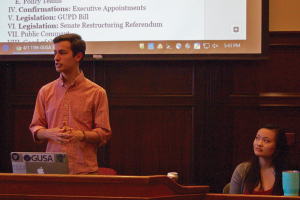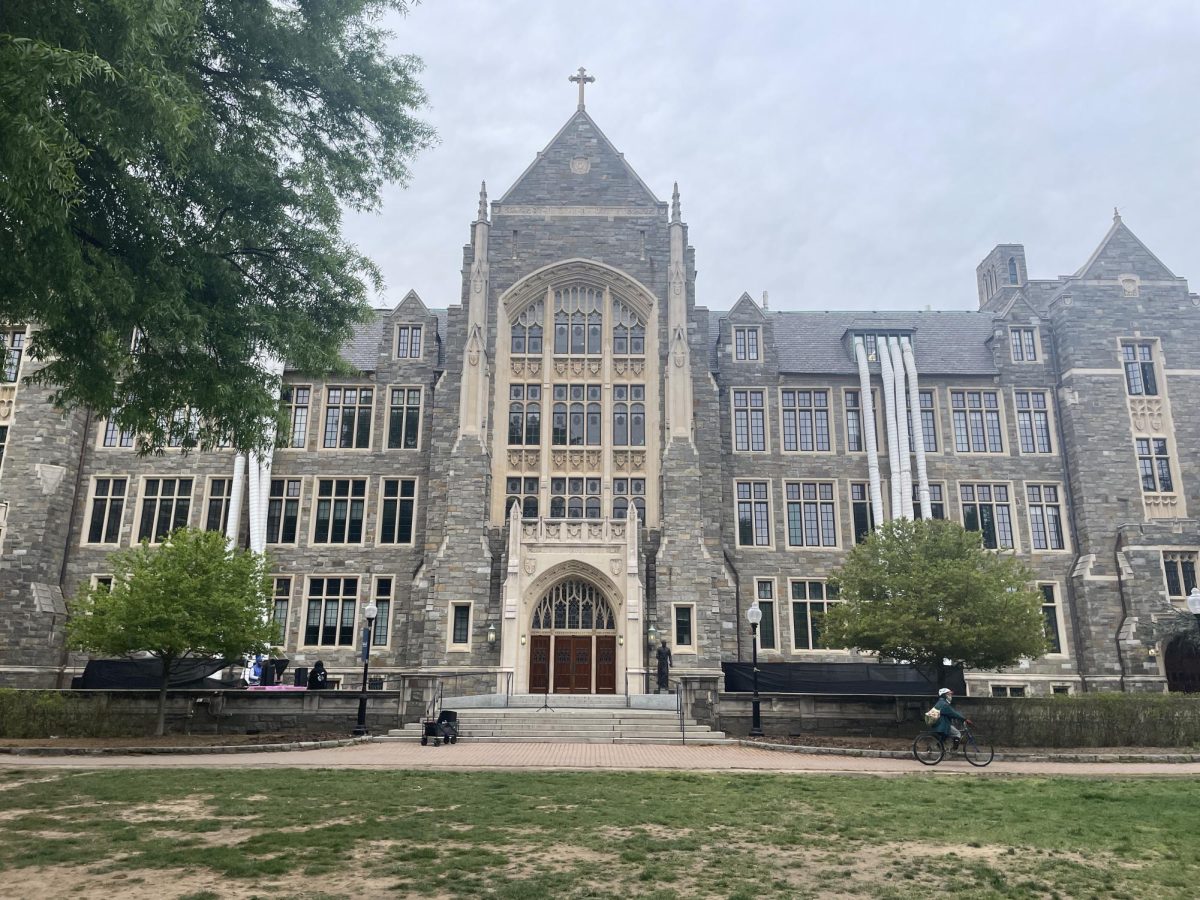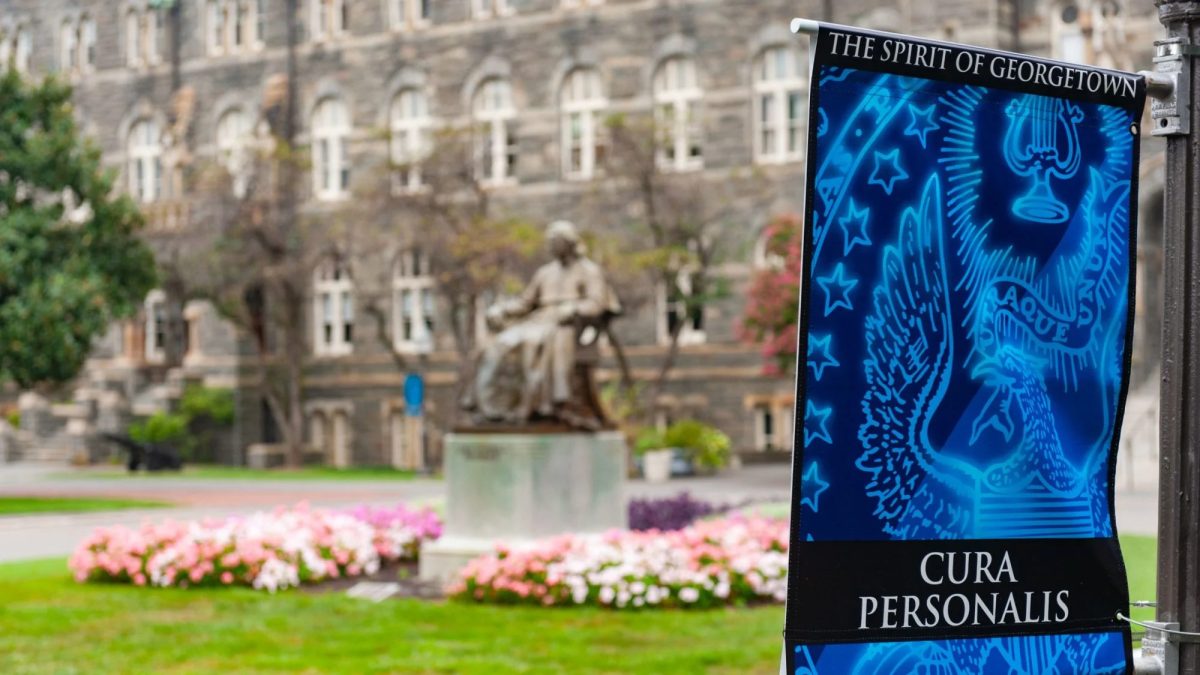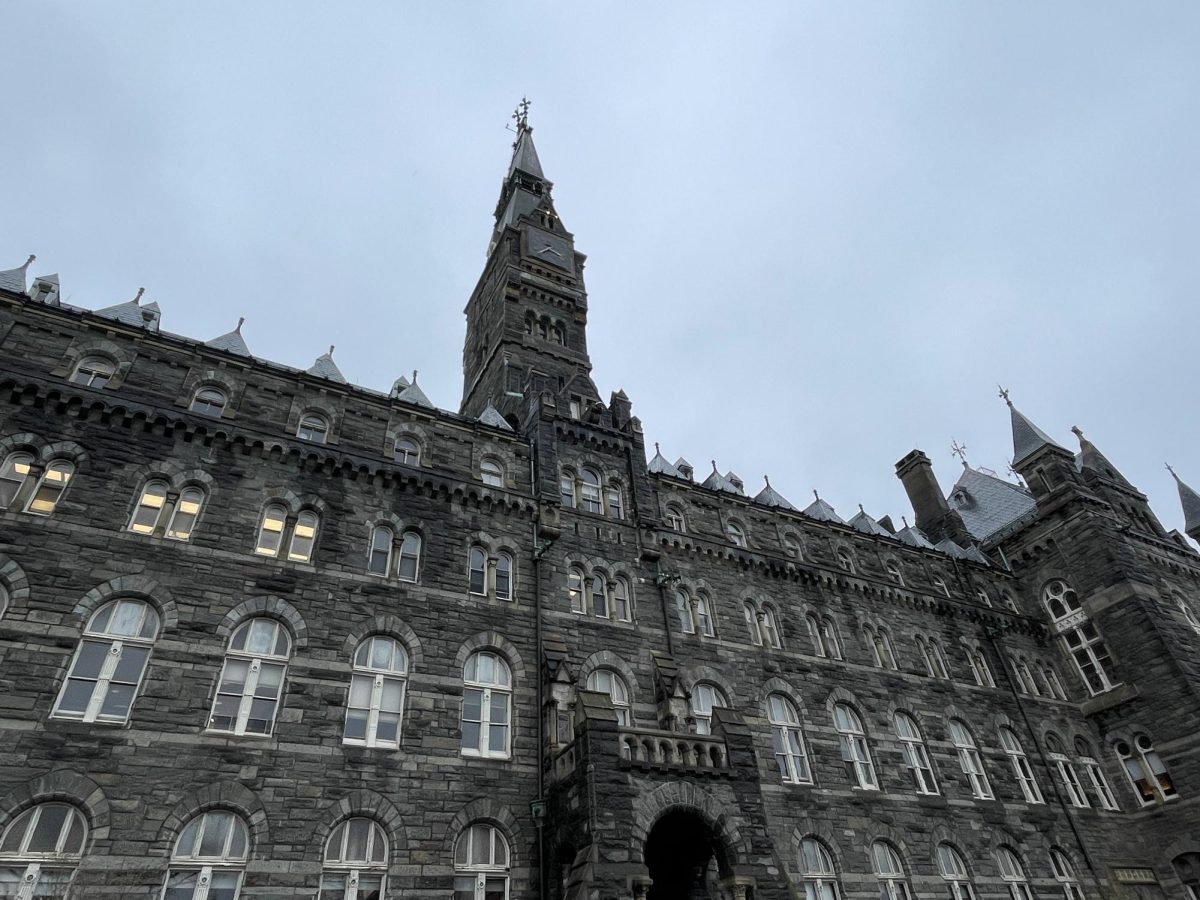
GUSA senate speaker Richie Mullaney (COL ’18), left, and senate vice speaker Cherie Vu (COL ’19) led the Senate vote to hold the referendum, which failed to pass Thursday.
A Georgetown University Student Association referendum on senate electoral reform failed to pass last night after receiving support from less than 25 percent of the student body – the minimum threshold required for the vote to pass.
The referendum, conducted over a three-day period, included two major reforms to the GUSA senate: the election of senators by class year rather than geographic district and the codification of outreach to underrepresented communities to encourage participation in student government.
The first proposed reform would have reduced the size of the senate from 29 to 24.
Other changes included in this question included moving senate elections to the spring.
The second reform proposed codifying existing GUSA diversity programs, including ElectHer, which seeks to recruit female students for elected positions, and A GUSA That Looks Like Georgetown, which seeks to encourage students from underrepresented populations to run for elected positions. The reform also proposed updating GUSA bylaws to prevent exclusion on the basis of identity.
The two questions received 88 percent and 93 percent support of voters, respectively, but total turnout was 23 percent of the student body. The most recent constitutional referendum in December saw 38 percent turnout before it was invalidated by the GUSA Constitutional Council for violating GUSA bylaws. The Dec. 1 referendum sought to abolish the GUSA senate and replace it with a smaller assembly with a narrower legislative focus on club funding.
Twenty-five percent of the student body needed to vote “Yes” for the referendum to pass. Voter turnout surged to 11 percent on the first day of the referendum, according to the GUSA Elections Twitter account, and crept up to 14 percent by the end of the second day. Turnout picked up again on the final day, in part due to a voting booth set up in Red Square.
The impartial voting booth was one of the reforms instituted by the GUSA senate following the council’s decision to invalidate the December referendum. Reforms sought to make the election and referendum process transparent and unbiased.
GUSA President Kamar Mack (COL ’19) said the executive can focus on policy goals now that the internal structure of the senate has been settled.
“GUSA executive has always supported the right of the student body to decide who represents them and how they are represented,” Mack said. “Now that the question of the internal structure is sort of settled, I am definitely excited to get to work with on issues such as affordability, student health and many other ways to help the student body.”
No one was to blame for low voter turnout, according to Mack.
“Now is just the end of April and a lot of people are turning their vision to finals and Georgetown Day is a big event happening tomorrow. I don’t know who the blame is for the turnout. I don’t think anyone is to blame for the turnout,” Mack said.
GUSA Election Commissioner Grady Willard (SFS ’18) said the time of year and nature of the referendum topic prevented voter turnout from reaching 25 percent.
“This referendum was a low turnout referendum in part because it was done in April and we are obviously not used to doing elections in April and it was a very arcane topic: GUSA restructuring,” Willard said. “It was held over three days to try to get more votes out.”
The polling station in Red Square, which ran from 9:30 a.m. to 3:30 p.m., was one of the highest sources of votes, garnering about 100 to 150 votes on the last day, according to Willard. There were no irregularities with voting on Hoyalink.
GUSA Senate Speaker Richard Mullaney (COL ’18) said voter turnout was an initial concern and that the senate needs to improve its outreach efforts.
“Students clearly support this type of reform but GUSA still has a lot of work to do engaging students,” Mullaney wrote in an email to The Hoya. “I’m extremely proud of the senate’s ability to address its own problems and seek to improve them. This senate is not too keen on giving up. I expect that we will continue to move forward with our efforts to better serve the students of Georgetown.
Students were able to vote for 72 hours and were able to vote on both referendum questions or just one.
GUSA Sen. Scott Lowder (COL ’17) said the 7 percent of voters who voted against the anti-inclusivity referendum should alarm all students.
“The fact that 113 students voted against basic non-discrimination protections should shock and disgust every decent Hoya on this campus and encourage all of us to stay vigilant in support of the marginalized communities among us,” Lowder wrote in an email to The Hoya.
Mack said the executive will continue to work with the senate to achieve policy objectives.
“We still want to work hand in hand with the senate. For us all we care about is improving the student experience, we are definitely going to zone in on working on the issues,” Mack said. “The referendum is time for us to reflect on what are the good things and what are the bad things about the structure.”



















Meal • Apr 29, 2017 at 3:24 pm
“No one was to blame for low voter turnout, according to Mack.”
Looks like someone took a cue from the Clinton campaign.
Dick Pointer • Oct 6, 2017 at 9:07 pm
Mack was against it from the beginning.